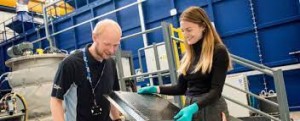Bristol’s status as a leading centre for cutting-edge academic research was boosted this week as it joined a new innovative digital health hub while also receiving £57m to train a new generation of scientists, mathematicians and engineers.
The University of Bristol and UWE Bristol have become part of the new digital health hub – made up of a consortium of universities from across the South West and Wales – which aims to catalyse innovation, research and collaboration by forging partnerships between industry, academia, patients, carers and healthcare professionals. 
Funded by the Engineering & Physical Sciences Research Council (EPSRC), it will also elevate the region’s digital health capability through leadership, engagement, acceleration and partnership (LEAP) to tackle unmet health and care needs.
Meanwhile, the £57m training investment, also mainly from the EPSRC, will fund research at nine Centres for Doctoral Training (CDTs) led by the University of Bristol in areas such as cyber security, global health resilience, sustainable energy and Artificial Intelligence (AI). Six of the CDTs are new and three are being renewed following previous successes.
The centres will train more than 500 PhD students over four years, starting this September, to help solve some of the most important social, health and environmental challenges of our times. Most of these students go on to deploy and share the skills acquired in businesses, including their own start-ups, public service or further research endeavours. 
University of Bristol pro vice-chancellor for Science and Engineering, Prof Ian Bond, said: “This is a hugely exciting achievement, which will generate a wealth of opportunities for highly capable postgraduate researchers to develop their ideas, skills, and expertise to deliver new research across a host of key disciplinary areas.
“Their work will help address some of the biggest challenges facing us today, harnessing the very latest knowledge and technology.
“Joining forces with existing and new academic, industrial and commercial partners, they will pioneer innovations and generate understanding for our future collective health, prosperity and security, while also forging their own promising careers.” 
The EPSRC said the University of Bristol was awarded the joint highest number of centres in this latest funding round, which bore testimony to its “broad research strengths and excellent track record in supporting and upskilling new talent on a global stage”.
Two of the centres, focused on key national priorities cyber security and AI, will be based at the University’s new £500m Temple Quarter Enterprise Campus, pictured above, which is currently under construction.
The CDT working on cyber security and resilience in large-scale infrastructures will help protect essential services, ranging from water, power and transport to banking, financial services and online interactions with family and friends.
Centre lead Awais Rashid, Prof of Cyber Security at the University of Bristol, said: “It is vital the systems, data, and information at the heart of our daily lives are cyber secure everywhere. We’re committed to developing future leaders who can anticipate and address the many challenges and threats posed, ensuring resilience, safety, and economic growth in a fast-changing world.”
The CDT in practice-focussed AI, the second in this field at the university, will support students to design and manage the entire lifecycle of AI applications in science and research. It will realise the potential of Isambarrd-AI, the UK’s fastest supercomputer set to arrive soon in Bristol,.
Other CDTs at the university will concentrate on environmental and health issues, with the engineering biology centre developing innovations in vaccine design, microbial communities to recover energy from wastewater, and engineering models for wound healing in living tissues.
The aerosol science CDT has already produced vital research since its launch in 2019 on the airborne spread of the virus, including during the Covid-19 pandemic. Its pioneering work will continue to address significant global challenges, including climate change, air quality, drug delivery, and sustainable new materials, informing public health policy and innovation.
University of Bristol vice-chancellor and president Prof Evelyn Welch said: “This is absolutely tremendous news for talented scientists and engineers, the university, and society as a whole.
“We are delighted to be at the forefront of training and championing the next generation of leaders, who will play a pivotal role in solving wide-ranging problems as well as improving people’s lives.
“It is especially exciting that two of the Centres for Doctoral Training are set to be based at our new Temple Quarter Enterprise Campus, which is fast taking shape and will empower tomorrow’s leaders to commercialise their research.
“Working with a host of industry partners, this will create jobs, attract inward investment, and support sustainable, inclusive growth for our region and beyond.”
The LEAP partnership network also includes a number of NHS trusts & health boards, social care organisations and local authorities, as well as Health Innovation West of England and the award-winning, University of Bristol-backed business incubator SETsquared.





























